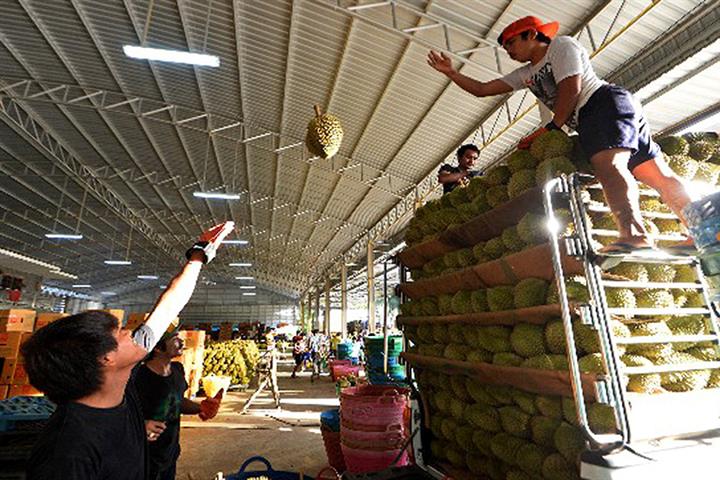 Durian Was Most Popular Imported Fruit in China Last Year With Imports of USD4.2 Billion
Durian Was Most Popular Imported Fruit in China Last Year With Imports of USD4.2 Billion(Yicai Global) Feb. 23 -- Last year, China imported USD4.2 billion worth of durian, an exotic fruit known for its pungent smell, making it the fruit with the biggest import value.
Some 821,500 tons of durian were imported into China in 2021, a 42.7 percent jump from the year before, according to statistics from China customs.
The vast majority of this came from Thailand, with China buying 90 percent of Thailand’s fresh durian exports that year, worth USD3.1 billion, according to the Thai Ministry of Commerce.
Surging demand was driven by Chinese consumers’ penchant for the good life and by expanding e-commerce channels. There are now three dedicated flights a week that transport fresh produce between Kuala Lumpur and China. A fresh Musang King durian, a cultivar prized for its unusual combination of bitter and sweet flavors, can reach its Chinese buyer in as little as four hours, but on average it takes two days.
For Thai durians, transport times are a bit longer at around 10 days as the fruit travels by sea. This timeframe is expected to be shortened considerably once the Sino-Thai high speed railway comes into operation in 2026.
Most durians enter China through Shenzhen, regardless of whether they arrive by sea or by air. This is because it is the closest major Chinese city to Southeast Asia, customs clearance is usually quick and also because as a first-tier city it is home to a huge market, said Zhao Bin, director of fruits-related planning at the online grocery platform Dingdong Maicai, whose sales of durian nearly tripled last year from the year before.
From Shenzhen, the durians are distributed to other cities. There is huge demand in the other three first-tier cities Shanghai, Guangzhou and Beijing.
“We take many aspects into account when selecting suppliers, including the cultivar, technologies and fertilizers,” said Zhao. “We want the durians we supply to our customers to satisfy their preferences from all dimensions, such as size, weight, sweetness, appearance and even the trace elements they contain.”
Although the Covid-19 pandemic might affect supply chains in the short term, in the long run booming demand for fresh produce in China will bring the trade ties between China and Southeast Asian countries closer.
Editors: Liao Shumin, Kim Taylor